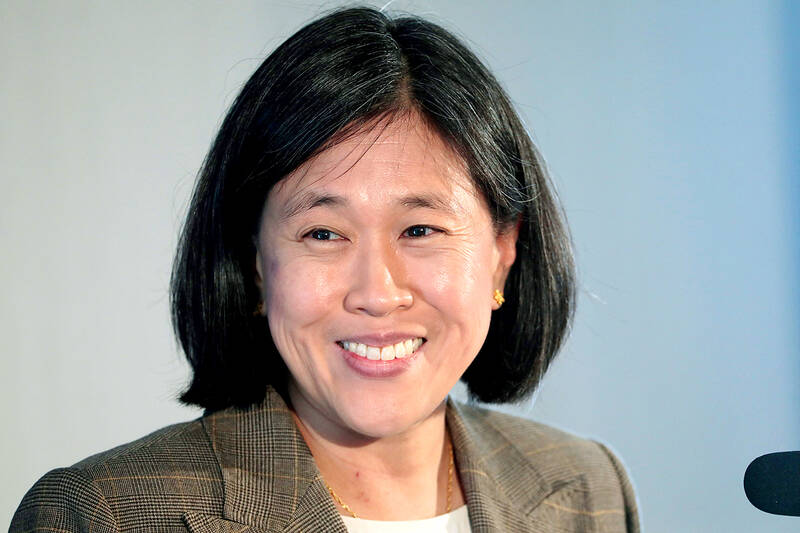US Trade Representative Katherine Tai (戴琪) on Friday raised complaints about China’s state-led economic policies during a meeting with Chinese Minister of Commerce Wang Wentao (王文濤), who objected to US tariffs and trade policies, as well as issues related to Taiwan, their offices said.
However, statements from the US Trade Representative’s (USTR) office and the Chinese Ministry of Commerce emphasized the need for Washington and Beijing to maintain communication on trade.
“Ambassador Tai highlighted the need to address the critical imbalances caused by China’s state-led, non-market approach to the economy and trade policy,” the USTR said in a statement released after the meeting on the sidelines of an APEC conference in Detroit.

Photo: AFP
“She also raised concerns about PRC [People’s Republic of China] actions taken against US companies operating there,” it said.
The Chinese commerce ministry said that Wang raised complaints about US economic and trade policies toward China, including US tariffs on Chinese goods, economic and trade issues related to Taiwan, and the US-led Indo-Pacific Economic Framework (IPEF), which excludes China.
Tai was yesterday scheduled to hold a ministerial meeting of countries in the IPEF talks, which aim to provide a US-centered alternative to China’s influence.
Last week, she announced initial trade agreements with Taiwan.
USTR is conducting a four-year review of US tariffs on hundreds of billions of US dollars worth of Chinese imports, imposed in 2018 and 2019 by then-US president Donald Trump.
Tai has long raised objections to China’s attempts to dominate certain industries using massive state subsidies, and said such issues continue to come up in the relationship.
Asked during a news conference whether the US would resort to using further trade tools to address China’s practices, such as a new “Section 301” investigation that could lead to more US tariffs, Tai said that “aspects” of Washington’s response were already evident in US economic policies.
“The benefit of sitting down and having a conversation with interlocutors from Beijing is so that we can understand each other better and understand how we are experiencing the impacts that we have on each other’s economies,” Tai said.
Wang’s meetings with Tai in Detroit and with US Secretary of Commerce Gina Raimondo in Washington on Thursday marked the first cabinet-level exchange in months between US and Chinese officials, following a series of setbacks that raised tensions between the world’s two largest economies.
Tai stressed the importance of maintaining open lines of communication between Washington and Beijing as they spoke on the sidelines of APEC, the US statement said.
The Chinese statement was similar in tone to concerns raised with Raimondo about US trade, investment and export policies.
US President Joe Biden and Chinese President Xi Jinping (習近平) pledged more frequent communications at a G20 summit in Indonesia in November last yearto avoid US-China tensions from turning into a new Cold War, but those plans suffered several setbacks, starting with the downing of a suspected Chinese spy balloon in US coastal waters.
These irritants continued through last Sunday, when G7 leaders pledged to resist China’s “economic coercion” and Beijing responded by declaring US memory chip maker Micron Technology a national security risk, banning its sales to major domestic industries.

‘UNUSUAL EVENT’: The Australian defense minister said that the Chinese navy task group was entitled to be where it was, but Australia would be watching it closely The Australian and New Zealand militaries were monitoring three Chinese warships moving unusually far south along Australia’s east coast on an unknown mission, officials said yesterday. The Australian government a week ago said that the warships had traveled through Southeast Asia and the Coral Sea, and were approaching northeast Australia. Australian Minister for Defence Richard Marles yesterday said that the Chinese ships — the Hengyang naval frigate, the Zunyi cruiser and the Weishanhu replenishment vessel — were “off the east coast of Australia.” Defense officials did not respond to a request for comment on a Financial Times report that the task group from

Chinese authorities said they began live-fire exercises in the Gulf of Tonkin on Monday, only days after Vietnam announced a new line marking what it considers its territory in the body of water between the nations. The Chinese Maritime Safety Administration said the exercises would be focused on the Beibu Gulf area, closer to the Chinese side of the Gulf of Tonkin, and would run until tomorrow evening. It gave no further details, but the drills follow an announcement last week by Vietnam establishing a baseline used to calculate the width of its territorial waters in the Gulf of Tonkin. State-run Vietnam News

Four decades after they were forced apart, US-raised Adamary Garcia and her birth mother on Saturday fell into each other’s arms at the airport in Santiago, Chile. Without speaking, they embraced tearfully: A rare reunification for one the thousands of Chileans taken from their mothers as babies and given up for adoption abroad. “The worst is over,” Edita Bizama, 64, said as she beheld her daughter for the first time since her birth 41 years ago. Garcia had flown to Santiago with four other women born in Chile and adopted in the US. Reports have estimated there were 20,000 such cases from 1950 to

DEFENSE UPHEAVAL: Trump was also to remove the first woman to lead a military service, as well as the judge advocates general for the army, navy and air force US President Donald Trump on Friday fired the chairman of the Joint Chiefs of Staff, Air Force General C.Q. Brown, and pushed out five other admirals and generals in an unprecedented shake-up of US military leadership. Trump wrote in a post on Truth Social that he would nominate former lieutenant general Dan “Razin” Caine to succeed Brown, breaking with tradition by pulling someone out of retirement for the first time to become the top military officer. The president would also replace the head of the US Navy, a position held by Admiral Lisa Franchetti, the first woman to lead a military service,